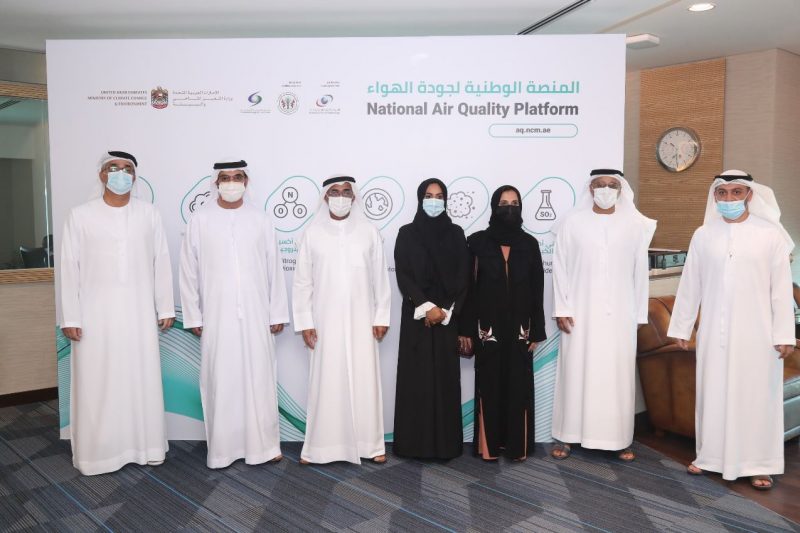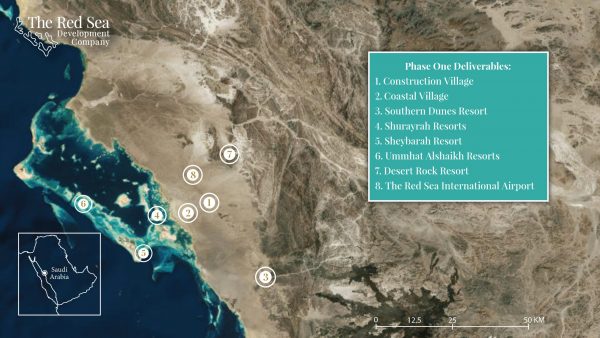Ministry of Climate Change and Environment Inaugurates National Air Quality Platform
Air Quality

September 8, 2020, 5:04 am
- Ministry introduces initiative in collaboration with National Center of Meteorology, Environment Agency – Abu Dhabi, Environment and Protected Areas Authority in Sharjah
- Launch coincides with International Day of Clean Air for Blue Skies
Abu Dhabi-UAE: 7 September, 2020 – His Excellency Dr Abdullah Belhaif Al Nuaimi, Minister of Climate Change and Environment, today attended the official launch of the National Air Quality Platform at the headquarters of the National Center of Meteorology (NCM) in Abu Dhabi. The event coincided with the first International Day of Clean Air for Blue Skies, declared by the UN to be observed every year on September 7.
His Excellency Faris Mohammed Ahmed Suhail Al Mazrouei, Adviser at the Ministry of Presidential Affairs and Chairman of NCM’s Board of Trustees, His Excellency Dr Abdulla Al Mandous, Executive Director of NCM and President of the Regional Association II (Asia) of the World Meteorological Organization (WMO), Her Excellency Dr Shaikha Salem Al Dhaheri, Secretary General of the Environment Agency – Abu Dhabi (EAD), and Her Excellency Dr. Nawal Al-Hosany, the UAE’s Permanent Representative to IRENA, were also present at the launch.
The platform falls within the framework of the initiative to establish a nationwide air quality network, approved by His Highness Sheikh Mohammed bin Rashid Al Maktoum, Vice President and Prime Minister of the UAE and Ruler of Dubai, as an output of the first Government Innovation Laboratory of the Ministry of Climate Change and Environment (MOCCAE). Accessible to the public, the official site provides a real-time overview of the current status of air quality in the UAE. In addition to serving the community, the information available on the site can benefit multiple sectors, including health and education.
On this occasion, His Excellency Dr Al Nuaimi said: “The UN’s declaration of September 7 as International Day of Clean Air for Blue Skies reflects the growing global interest in human health, environmental protection, and climate change mitigation. The wise UAE leadership has prioritized these areas for years, and implemented multiple pioneering projects and initiatives to support them.”
He added: “The launch of the National Air Quality Platform is an important step that will enable researchers and academics to study the impact of factors such as the desert environment, industrial progress, and population density on air quality. Through mapping the levels of air pollution in the country using information received from 31 monitoring stations across the UAE, the platform contributes to protecting public health as well as our environment.”
The Minister noted that MOCCAE focuses on enhancing the UAE’s performance in national air quality indicators in partnership with relevant federal and local government entities through conducting research, implementing best practices in air quality management, and developing joint initiatives to improve ambient air quality.
He commended the important role of UAE talent in government entities participating in the running of the platform, and thanked the Ministry of Presidential Affairs for its continued support in the pursuit of government excellence and boosting the UAE’s global competitiveness in the field of air quality.
By establishing the National Air Quality Platform, MOCCAE aims to enhance cooperation between relevant entities in monitoring air quality, and coordinate their efforts through a central platform that links all air quality monitoring stations in the country. In addition, it seeks to adopt a unified mechanism for reporting air quality data based on the Air Quality Index (AQI).
The Ministry also cooperates with its partners to run nationwide awareness campaigns with the goal of highlighting the effects of air pollutants on public health, encouraging society to reduce emissions, and promoting environment-friendly practices that positively affect air quality. MOCCAE provides technical support while facilitating the exchange of experience and knowledge transfer between the interested parties.
For his part, His Excellency Dr Al Mandous noted that the wise UAE leadership views monitoring and improving air quality in the country as a top priority due to its significant impact on human health and the environment.
He added: “We are pleased to cooperate with MOCCAE, EAD, and the Environment and Protected Areas Authority in Sharjah on establishing the first national electronic platform for monitoring air pollutants in the UAE. Having played a pivotal role in creating the site, the Center has assigned a team of specialists to conduct ongoing review and analysis of the data received from its network of 11 air quality monitoring stations. The platform provides citizens and residents with essential information that enables them to avoid areas with high air pollution levels, which is especially important for the elderly, children, and people with health issues.”
Her Excellency Dr Al Dhaheri emphasized the importance of the National Air Quality Platform in enhancing the efforts made by MOCCAE and its strategic partners. She noted that the platform will undoubtedly contribute to collecting real-time data on air pollutants, which will assist in making informed decisions, developing policies on air pollution controls, and evaluating the effectiveness of measures taken to maintain or improve air quality. It will also provide information about air quality to members of the public so that they can learn about air quality in their area and make appropriate decisions regarding exposure to different levels of air pollution, and better control factors that affect their health.
Her Excellency Dr Al Dhaheri pointed out that over the years, EAD has developed one of the best air quality monitoring networks in the GCC region that provides the emirate of Abu Dhabi with comprehensive and accurate data on air quality. The Agency has been operating and maintaining a network of 20 fixed stations and two mobile stations to monitor air quality since 2007. The network collects detailed data about the concentration levels of each pollutant in the emirate, enabling EAD to develop sustainable strategies for managing and improving air quality.
The Agency shares the emirate’s air quality network data with MOCCAE to be used on the National Air Quality Platform. The launch of the nationwide platform facilitates the exchange of and access to data from all emirates to support the objectives of the National Agenda of the UAE Vision 2021.
Her Excellency Hana Saif Al Suwaidi said: “The National Air Quality Platform follows the required protocols to promote sustainable development and safeguard the environment by monitoring air quality in the UAE using real-time data from stations that measure the concentration of pollutants in the air.”
She added that in line with the directives of His Highness Sheikh Dr Sultan bin Muhammad Al Qasimi, Supreme Council Member and Ruler of Sharjah, the Environment and Protected Areas Authority in Sharjah, in collaboration with Sharjah Executive Council, has established a network to monitor 12 environmental indicators, including air quality, in Sharjah. Using high-precision measuring devices, the network falls within the framework of the Authority’s strategy aimed at protecting the environment and monitoring and controlling activities that are harmful to the environment with the objective of safeguarding public health and safety.
The National Air Quality Platform features the AQI, developed according to the standards of the United States Environmental Protection Agency (EPA), which is a simplified representation of data collected from each air quality monitoring station in the UAE. Equipped to EU and EPA standards, the state-of-the-art stations cover various residential, industrial, and rural areas across the country as well as areas near the main roads.
The AQI is based on measuring the levels of five major pollutants – nitrogen dioxide (NO2), carbon monoxide (CO), ground-level ozone (O3), particulate matter with a diameter of 10 microns or less (PM10), and sulfur dioxide (SO2). The index uses a scale of 0 to 500, with 500 representing the highest level of air pollution. The lower the number, the cleaner the air.
Users can check air quality according to area and learn about the health risks associated with each air pollution level, categorized by colors:
- Green indicates that air quality is suitable for exercise and other outdoor activities for all individuals.
- Yellow indicates that air quality is acceptable to most individuals, however, prolonged exposure may be uncomfortable for people with respiratory diseases or those performing strenuous outdoor activities, such as sports or physical labor.
- Orange indicates that members of sensitive groups may experience minor negative health effects.
- Red indicates that air quality may affect healthy individuals, with increased impact on members of sensitive groups.
- Purple indicates that the entire population is likely to be affected, with the recommendation to avoid outdoor activities.
- Burgundy indicates a serious threat to the health of the entire population, with the recommendation to stay indoors.
The National Air Quality Platform will undergo ongoing development, with the planned addition of satellite images monitoring dust movement as well as air quality models.
The National Air Quality Platform is now available on NCM’s official website at https://aq.ncm.ae or https://airquality.ncm.ae.










